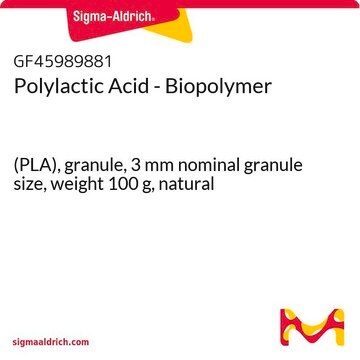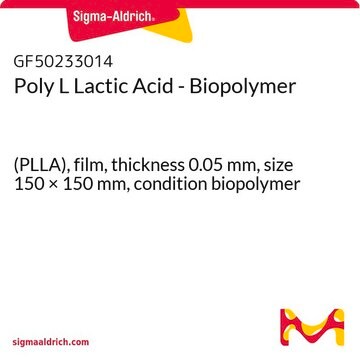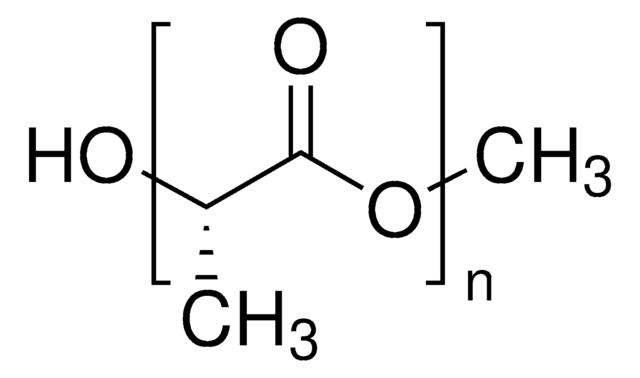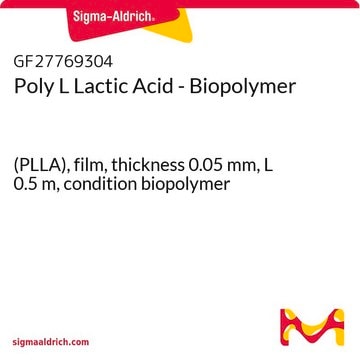764698
Poly(L-lactide)
average Mn 20,000, PDI ≤1.1
Synonym(s):
PLA, PLLA, Polylactide, L-Lactide polymer, PLA, Poly(L-Lactic acid)
Sign Into View Organizational & Contract Pricing
All Photos(2)
About This Item
Linear Formula:
H(C3H4O2)nOCH3
UNSPSC Code:
12162002
NACRES:
NA.23
Recommended Products
form
solid
Quality Level
optical activity
[α]22/D -153°, c = 0.5% in chloroform
mol wt
average Mn 20,000
degradation timeframe
>3 years
transition temp
Tm 167-172 °C
PDI
≤1.1
storage temp.
2-8°C
Looking for similar products? Visit Product Comparison Guide
General description
Poly (L-lactide) is a semi-crystalline polymer which exhibits strong optical rotation and good mechanical properties. It is mostly used in the synthesis of degradable polymers which are used in orthopaedic devices, in dental applications, as scaffolds for autografted new skin, wound covers, anastomose systems and stents. They are biodegradable since the polyester backbone degrades by simple hydrolysis to form non-toxic compounds.
Application
Used in Drug Delivery including coating nanoparticles. Can be end-group functionalizated or used as a macroinitiator/block precursor.
Features and Benefits
High initial strength, good strength retention and high amount of crystallinity as much as 70% which in turn is responsible for the very slow degradation rate.
Storage Class Code
11 - Combustible Solids
WGK
WGK 3
Flash Point(F)
Not applicable
Flash Point(C)
Not applicable
Choose from one of the most recent versions:
Already Own This Product?
Find documentation for the products that you have recently purchased in the Document Library.
Customers Also Viewed
Effect of poly (ethylene glycol)-block- poly (L-lactide) on the poly [(R)-3-hydroxybutyrate]/poly (L-lactide) blends
Yoon, J. S., Lee, W. S., Kim, K. S., Chin, I. J., Kim, M. N., & Kim, C.
Eur. Polymer J., 36(2), 435-442 (2000)
Synthesis and thermal properties of novel star-shaped poly (l-lactide)s with starburst PAMAM-OH dendrimer macroinitiator.
Zhao, Y. L., Cai, Q., Jiang, J., Shuai, X. T., Bei, J. Z., Chen, C. F., & Xi, F.
Polymer, 43(22), 5819-5825 (2002)
Chemical synthesis of polylactide and its copolymers for medical applications
Bendix, D.
Polymer Degradation and Stability, 59(1), 129-135 (1998)
Wolf, Florian F.; et al.
Macromolecules, 42, 5622-5628 (2009)
Zhang, Wen-Bin; et al.
Macromolecules, 44, 2589-2596 (2011)
Our team of scientists has experience in all areas of research including Life Science, Material Science, Chemical Synthesis, Chromatography, Analytical and many others.
Contact Technical Service









